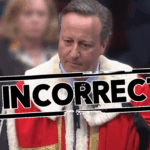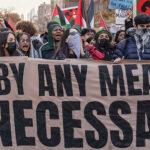The UK is on the verge of formally proscribing Iran’s Islamic Revolutionary Guard Corps (IRGC) as a terrorist organisation, according to reports this week.
CUFI has been calling for the UK to ban IRGC as part of its long-term Operation Mordecai, exposing the threat of Iran to Israel and the West.
The legal change would make it a criminal offence in the UK to belong to or support the IRGC, and would send a strong message of condemnation to the Iranian regime and its terror activities. The UK’s position towards Iran has hardened over recent months after intelligence agencies said the country posed a direct threat, citing 10 plots against British or UK-based individuals over the last year.
Any decision by the UK to proscribe the IRGC would also make it even harder to revive the failed deal over Iran’s nuclear programme.
Whilst Whitehall sources said no announcement was imminent, they said it was “broadly correct” to say the government intended to proscribe the IRGC.
The proscription – first reported by the Daily Telegraph – would follow a similar decision made by the US in 2019.
Last month, Prime Minister Rishi Sunak addressed Iran’s influence at CFI’s annual business lunch, saying its activities “aren’t just confined to the Middle East”.
He referenced the “important actions” of his predecessors in proscribing Hamas and Hezbollah and said he was committed to “utilising the full range of tools at our disposal to protect UK citizens from the threat of the IRGC and Iran”.
He added that “under my leadership, the UK will not waver in our commitment to work with Israel and our allies to prevent Iran acquiring a nuclear weapon”.
The UK’s relationship with Iran has nosedived in recent months. Last year, MI5 issued a rare warning to exiled Iranian journalists living in the UK after credible threats to their safety from Iranian agents operating in the British capital.
Sunak cited that the “National Cyber Security Centre has exposed IRGC-linked attacks on critical national infrastructure” and that “the head of MI5 has spoken of at least ten threats this year to kidnap or even kill UK-based individuals”.
UK and Iran are also at odds over Ukraine, where Britain’s support for Kyiv is coming up against Russia’s use of Iranian drones, while London has also issued strong condemnation of Iran’s violent crackdown against Iranian protesters angered by the killing of a young woman by morality police for not wearing a hijab.
The IRGC is a combined arms forces with its own navy, ground force, air force, intelligence arm, and special forces. It controls the 90,000-strong Basij militia and is responsible for much of the arms flow across the Middle East.
Internally, it is charged with coordinating Iran’s national response to any attacks on Iranian nuclear facilities, developing its ballistic missile programme, and protecting Iran’s coast, where IRGC boats get into frequent skirmishes with Western vessels in the Strait of Hormuz, a vital shipping lane.
In November, Israel’s Defence Minister Benny Gantz said: “Iranian aggression continues to be a great threat to the region and the world”.
He added: “It is critical to stop the spread of Iranian influence and ambitions. This is what Israel aims to achieve and we will continue to operate against any attempt to build terror bases on our borders.”
The IRGC last week arrested seven people with links to the UK in relation to anti-government protests that have been sweeping through Iran in recent months.
Last month, Foreign Secretary James Cleverly announced that sanctions had been imposed on the IRGC in its entirety.
But there has been growing parliamentary pressure for the government to go further. During last summer’s Conservative leadership contest – won by Liz Truss – Rishi Sunak said there was “a case for proscribing the IRGC”.
A government spokesman said: “Whilst the government keeps the list of proscribed organisations under review, we do not comment on whether a specific organisation is or is not being considered for proscription.”











